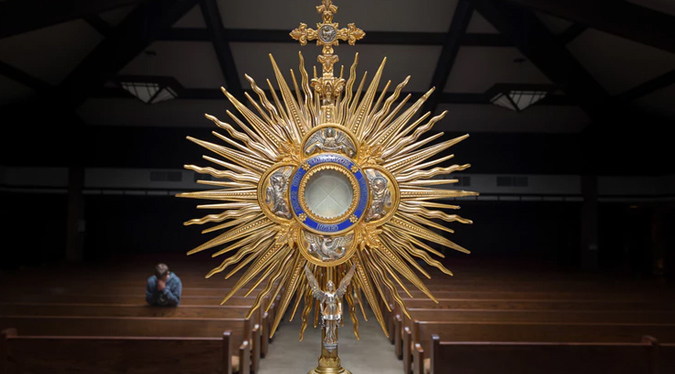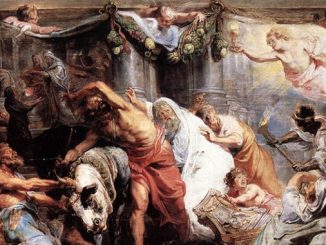
This series of Sundays during which we hear from the Bread of Life Discourse in John 6 causes us to consider the incomparable love of Jesus, revealed and given to us in the Holy Eucharist. It is good for us to consider a bit further what this love “looks like”, especially what it means for Jesus to describe the Bread of Life as His “Flesh for the life of the world” (John 6:51).
After my first year as a seminarian at Sacred Heart Major Seminary in Detroit, my classmates and I spent eight weeks in Mexico during the spring and early-summer, and the last two weeks of the trip were spent doing mission work in the mountains about four hours outside of Acapulco. The mission to which we were sent included three villages, the largest of which had about 5000 residents who lived in a primitive kind of poverty I had never experienced before.
The mission was entrusted to two PIME missionary fathers from Italy. One day we tagged along with one of priests, Fr. Graziano, on a Communion call to a woman living on a hill some distance from the mission church. We entered the woman’s house and again I was struck by a simplicity I had never seen before. Some of the poorest homes I’ve visited here in the States were much nicer than this house. On a small bed in the living room—I don’t think there was a bedroom—lay an elderly woman who appeared not to be able to move. Father Graziano walked up to her bedside and we followed like curious ducklings, sidling up to Father and getting a closer look at the woman we were visiting.
After leaving the house, Father would explain to us that the woman had cancer and could not afford any treatment for it; she had no insurance and no way even to travel to the hospital in Acapulco. At her bedside, I only knew that I was seeing the largest protrusion I had ever seen sticking out of the poor woman’s neck—a grapefruit-sized tumor. It was all she could do to smile and raise her hand to greet us. Father began the ritual for Holy Communion outside of Mass, and I’ll never forget that when the moment came for her to receive Our Lord, this woman used what was obviously all the energy she had—more energy than she had to perform any other kind of act—sat up almost straight and said “amen”, receiving Holy Communion with a devotion so obvious and sincere that it still stirs me with awe and a touch of shame for loving Jesus so little.
Clearly, such devotion is very much to be admired, and, by God’s grace, imitated. But we do well to think also, and even first, not about that poor woman’s love for Jesus, but about His love for her. She did all she could to greet Our Lord with love and devotion, but she only had the opportunity to do so because He loved her enough to come from heaven under the appearance of bread, to travel the dusty village roads in Father’s little pyx, to enter the cramped house, and to allow her to eat the Bread of Life which is Himself. Dante in his Paradiso describes the love of God as “the love that moves the sun and other stars.” Beautiful as that description is, it leaves out the truth that in love God Himself moves towards us, seeks us, finds us, knocks on the door of our hearts and asks for our welcome. And He does this because He greatly desires our union with Him and will do anything, short of overwhelming our freedom, to give us the gift of salvation.
We know that the Eucharist is the fulfillment of Jesus’ promise in Matthew 28 that He would be with us “until the end of the world.” And certainly, the presence of Jesus by itself is consoling beyond measure to those who believe in Him. The Eucharist, however, is not only about Our Lord’s presence but also about His action. As St. John Paul II wrote in his encyclical Ecclesia de Eucharistia:
The Church has received the Eucharist from Christ her Lord not as one gift – however precious – among so many others, but as the gift par excellence, for it is the gift of himself, of his person in his sacred humanity, as well as the gift of his saving work.
Jesus makes Himself present in the Eucharist, and He continues His saving and life-giving work in the Eucharist. His sacrifice becomes sacramentally present at every Mass. He allows Himself to be handled and distributed by the Church’s priests and other ministers so that His faithful might receive Him. Once received, He works on us from within, transforming us and drawing us into closer intimacy with Himself. And even as we adore Him, when He seems most passive, He is silently active, drawing our hearts to Himself and teaching us the wisdom of God.
The work of Jesus—His self-giving for the life of the world—is to become our work as well. The French Bishop Dominique Rey once wrote in a book about the Eucharist and evangelization, “Prayer commits us to radicalizing our relationship with Christ.” Bishop Rey added, “Eucharistic Adoration is a school of fervour. In contemplating the Eucharistic Jesus, given so that the world might have life, we are invited to give our own life in return, to Christ and to our brothers.”
Jesus gives His flesh for the life of the world, and we are to give our flesh for the life of the world. We can trace the saying “a pound of flesh” back to Shakespeare’s The Merchant of Venice (4:1), in which the lender Shylock insists upon receiving the pound of flesh promised him in payment for a loan made to Antonio. Portia, advocating for Antonio, responds that Shylock may have it but without an ounce of blood, since blood had not been promised. So Portia outwits Shylock by making the payment impossible. In this story, the demands of a sinful world meet with a correspondingly shrewd response. In the story of our salvation, Jesus pays the price of our redemption with both His flesh and His blood, and He calls us to imitate His self-emptying love.
It goes without saying that our imitation is not easy. And we are all-too-aware these days of the destruction wrought by our failure to love. The sex abuse crisis is very much rooted in a self-centered distortion of love, one which is so extreme that those who give in to it would even destroy another person’s life in order to satisfy the corrupt desires of the flesh. That is the very opposite of Christ’s sacrifice of His flesh “for the life of the world.”
Yes, living Christ’s love is difficult. It requires that we suffer with perseverance. There are many crosses to bear in this life, many situations we find especially trying, whether we are tried spiritually, psychologically, physically, or in any other way. But one lesson we can all draw from this shameful chapter in the history of the Church here in the United States is that the love of Christ is the only true love, the only love that can save us.
Also, our moments of suffering in love are times when the Eucharistic Jesus can reveal to us, if we let Him, that His “yoke is easy and (His) burden light” (Matthew 11:30). Jesus comes to us every time we celebrate Holy Mass and gives us strength through our union with Him. We also draw close to each other every day, the distances between us melting away in the mystical nearness that happens when we all draw close to the Eucharistic Lord. In the Eucharist we are equipped by God to do the saving work of Jesus, to love what frail nature often loathes, and to lay down our lives in sacrifice not in some hypothetical future, but in whatever “here and now” we find ourselves.
We may feel alone during difficult times, but every time we see the Blessed Sacrament, we remember that we are never alone. As Archbishop Allen Vigneron (my bishop here in Detroit) has often said, in the Incarnation God has come to live with us, and He is never going away. By making His flesh and blood sacramentally present to us, Jesus makes good on His promise to remain with us always.
The fulfillment of Christ’s promise is a tremendous consolation to us, but here we also have a challenge. “Without cost you have received; without cost you are to give,” Jesus says in Matthew 10:8. In Luke 6:38, He says, “Give and gifts will be given to you; a good measure, packed together, shaken down, and overflowing, will be poured into your lap. For the measure with which you measure will in return be measured out to you.” We are not mere consumers at a kind of heavenly Walmart. We receive the consolation of Jesus in large part so that we will be ready to share His consolation, to bring the presence and love of Christ to everyone we meet.
There was a spate of ecclesiastical documents on the Holy Eucharist in the early-to-middle years of the last decade, which in some ways culminated in the 2007 Post-Synodal Apostolic Exhortation of Pope Benedict XVI, entitled Sacramentum Caritatis, the “Sacrament of Charity.” The special focus of several of these writings was on the link between the Eucharist and the mission of the Church, which is to share Christ and His saving Gospel.
The Eucharist reveals God’s existence and presence among us. The Eucharist continues the work of redemption in Jesus Christ. The Eucharist is a model of humility. The Eucharist is our food for the journey from earth to heaven. The Eucharist is the fuel of evangelization and the reception of the Eucharist by new members of the faithful is the summit of that to which evangelization aspires. In all of this, the Eucharist is the Sacrament of Charity, because “God is love” (1 John 4:8), Jesus is God, and the Eucharist is Jesus here with us. And the Eucharist is also the Sacrament of Charity because the Sacrament strengthens us in charity, calling us to join Jesus in giving our flesh, making a sacrifice of our lives, for the life of the world.
If you value the news and views Catholic World Report provides, please consider donating to support our efforts. Your contribution will help us continue to make CWR available to all readers worldwide for free, without a subscription. Thank you for your generosity!
Click here for more information on donating to CWR. Click here to sign up for our newsletter.







What a homily. Truth be told, it has left me a bit emotional. It is good to hear peoples personal experiences and, what Father relates here of his time in Mexico,I found to be very moving. How could it be otherwise? There is so much here that I constantly need to be reminded of. I believe that in my part of the world, there are two things us Catholics need to give a lot of attention to. Firstly: recapturing a deep rooted sense of the sacred; especially in our churches. Weekday Mass going, Rosary saying Catholic included. Related to this: some kind of return to quite contemplative prayer. Given the barrage of noise in society and, sad to say, our churches, this is challenging. This is what this homily does: challenges me. It also maps out why the challenge is so worthwhile.
Stephen in Australia.
The Spirit of Christ within us is what makes us ambassadors for Christ; and makes us His hands and feet on the earth.